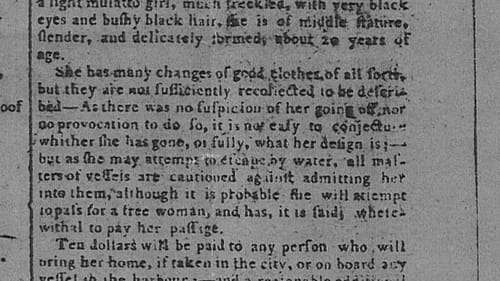Stay in the Loop
BSR publishes on a weekly schedule, with an email newsletter every Wednesday and Thursday morning. There’s no paywall, and subscribing is always free.
A life of resistance
Erica Armstrong Dunbar's 'Never Caught'

At the recent Stand Against Hate rally at Philly’s Independence Mall, when I was carrying Erica Armstrong Dunbar’s book about George and Martha Washington’s runaway slave, I was having trouble.
To the east, a massive banner on the National Museum of American Jewish History quoted a 1790 letter from President Washington to the Hebrew Congregations of Newport: “For happily the Government of the United States gives to bigotry no sanction, to persecution no assistance…” To the west, the outdoor exhibit of the remains of the President’s House listed the names of slaves who served Washington, including a young woman named “Oney Judge.”
“Without the least provocation”
As Dunbar illuminates in her new book, Never Caught: The Washingtons’ Relentless Pursuit of Their Runaway Slave, Ona Judge, about three years after Washington penned those lofty words in 1790 (loftily displayed in 2017), he signed the Fugitive Slave Act. Near the end of his presidency, he advertised in newspapers in hopes of finding the enslaved woman who had slipped away from his household in 1796 and never looked back.
Dunbar reproduces one of these ads, from May 1796, in her book. Washington offered a $10 reward for the return of Judge, “a light Mulatto girl” who fled “without the least provocation.”
During a February appearance at the Free Library, Dunbar referred to Judge as “a 22-year-old black woman who resisted the president of the United States” and quipped that, more than 200 years later, maybe we can relate.
“Why don’t I know this story?”
Dunbar lives outside Philadelphia and is a professor of black studies and history at the University of Delaware. She discovered Washington’s archived ads in research for another project. “Why don’t I know this story?” she asked herself.

Why had no one told the story of an illiterate black woman who escaped the president in the 1790s and lived the rest of her life on a knife edge, praying she wouldn’t be caught and forced back into slavery at Mt. Vernon?
There isn’t exactly a surfeit of primary sources on people like Judge. As Hidden Figures reminds us, black women’s stories and achievements, even at the most crucial junctures of 20th-century history, are easily erased. What about black people from centuries ago whose freedom -- and often their lives -- depended on leaving no trace of evidence?
From a research perspective, a book about a person like Judge is a mighty undertaking.
Fortunately, about 50 years after her escape, Judge (who eventually married and became Ona Staines) granted interviews to a pair of abolitionist newspapers. These serve as some of the only direct records we have of narratives like hers.
The rest of Dunbar’s work is a marvel of research and educated conjecture. The author said she pulled “on the fragile threads of history,” collecting “shards of evidence written by or about black women” and weaving them into the much better known context of scholarship about the Washingtons, their family, and estate.
Getting past the founding fathers
Readers should discover for themselves what drove Judge to escape and what happened after she fled. But until his death in late 1799, George Washington used every means at his disposal to recover his human property.

Though reading about life for slaves and free black people in late-18th-century America can be grueling, Never Caught is also a breath of fresh air for history enthusiasts. Finally, there’s a story about the nation’s early years that doesn’t simply lionize its founding fathers.
The Washington of Dunbar’s scholarship is a stubborn slaveholder who repeatedly flouts Northern abolition laws during his presidency — and a chronically impecunious man who struggled with public life and his own health.
Judge, naturally, is harder to know. When Dunbar finally shares a few of Judge’s own rare words, it’s a small but piercing moment we don’t see until more than 100 pages in. If more excerpts like this exist from Judge’s interviews, I wish they could have been woven into Dunbar’s text.
Normalizing hate?
For anyone insisting we can’t “normalize” hate and discrimination in the age of President Trump, if a book like Never Caught is a startling portrait of George and Martha Washington (or if it’s strange to see them as characters secondary to a black woman), this forces us to consider that bigotry has always been the norm. Every time we idealize Washington, we live and breathe that historic and contemporary normalization.
But that makes Judge’s story all the more relevant, and even optimistic. As Dunbar explained at the Free Library, Judge’s escape framed a larger problem for the U.S. president than the loss of a slave: She was a problem he was never able to solve.
“What did it mean that you couldn’t control this one woman?” Dunbar asked. It’s a question millions of US women can ask themselves today, and it’s a privilege to add Judge’s story to our cultural lexicon.
What, When, Where
Never Caught: The Washingtons’ Relentless Pursuit of Their Runaway Slave, Ona Judge. By Erica Armstrong Dunbar. Simon & Schuster, 2017. 253 pages, hardcover; $26.00, available at amazon.com.
Sign up for our newsletter
All of the week's new articles, all in one place. Sign up for the free weekly BSR newsletters, and don't miss a conversation.

 Alaina Johns
Alaina Johns